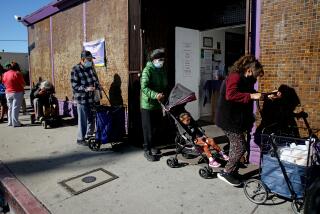Harmony House Shelters Women Who Need to Regain a Normal Life
- Share via
Melvia Darden, a colon-cancer patient, lost her apartment because of the medical bills. Tracy Newsome said she had to leave home after her boyfriend threatened her with a butcher knife. Ann Quakenbush, who took a bus to Los Angeles from Grand Rapids, Mich., ran out of money and had no place to stay.
At Harmony House, a 62-bed women’s shelter in South-Central Los Angeles, these women receive the basics to begin a new life. The six-year-old center at 911 E. 25th St. provides one-, two- and three-person rooms, washing machines and a kitchen.
“It’s clean and safe,” said Newsome, 28. “I have a chance to save some money, get on my feet and get my own place.”
Newsome, like many residents, learned about Harmony House through a social service worker. Other referrals come by Info Line, a referral service for the homeless, other shelters or by word-of-mouth. Applicants must be between 18 and 54.
“We will take anybody as long as they are not a threat to themselves or to anyone else,” said Kathy McCullom, the executive director.
For McCullom, Harmony House is more than a quick solution to get women off the streets. “My vision was to create something as close to a normal life as possible,” she said. “For now, this is their family, and we encourage them to share in the responsibility to make this place home.”
As part of their mandatory daily chores, the women make their beds, empty trash cans, vacuum rooms and hallways, and water plants. Nightly curfew is at 9. Once a resident begins to work or receive state aid, she is required to save 75% of her income. Stay at the shelter is limited to six months.
“When they are homeless for so long, they can lose touch with reality,” McCullom said. “We try to help them become functional. We want them to do something to better themselves. And the longer they’re here, the more they begin to function by themselves.”
The home offers medical help, social services, employment referrals, drug-abuse support groups and AIDS education workshops.
A nonprofit entity, Harmony House is supported by $143,000 in city and federal funds annually. The Second Baptist Church, which founded the shelter, has donated the use of the property and pays its utility bills.
The center also has a free lunch program. McCullom estimates that the kitchen feeds 300 individuals daily--including shelter residents--Monday through Saturday. Residents fend for themselves on Sundays.
“We don’t ask any questions,” McCullom said. “We feed anybody who comes to the door.”
Before Darden, 45, lost her apartment in Marina del Rey, she said she saw homeless individuals as lazy. “I never expected to be homeless,” Darden said. “The first night here I cried.”
Darden credits the family-like atmosphere and support network McCullom and her seven-member staff have created with making her feel at home: “It’s really nice here. We share our experiences and our plans. I don’t feel so alone. I have friends.”
More to Read
Sign up for Essential California
The most important California stories and recommendations in your inbox every morning.
You may occasionally receive promotional content from the Los Angeles Times.










